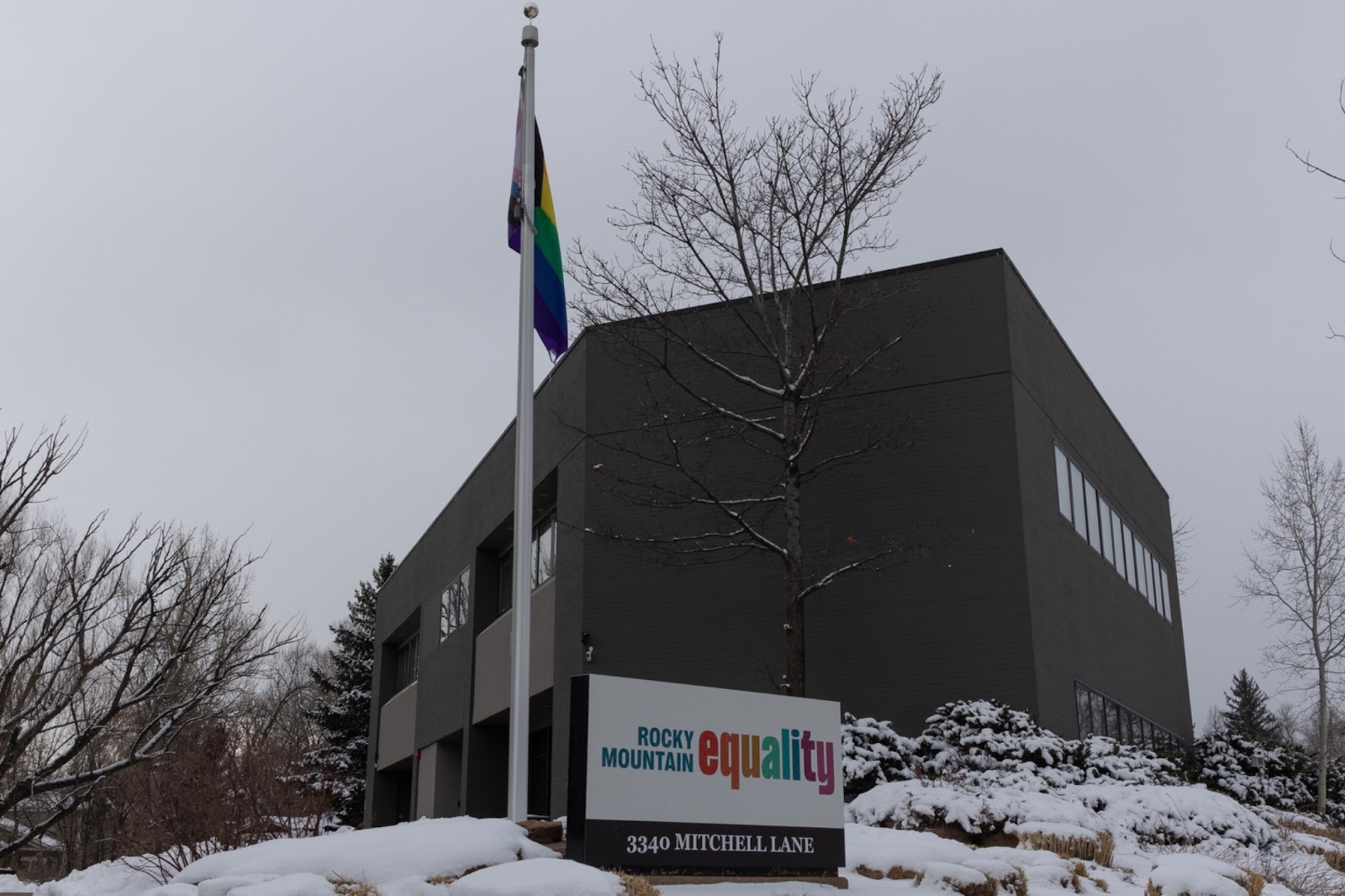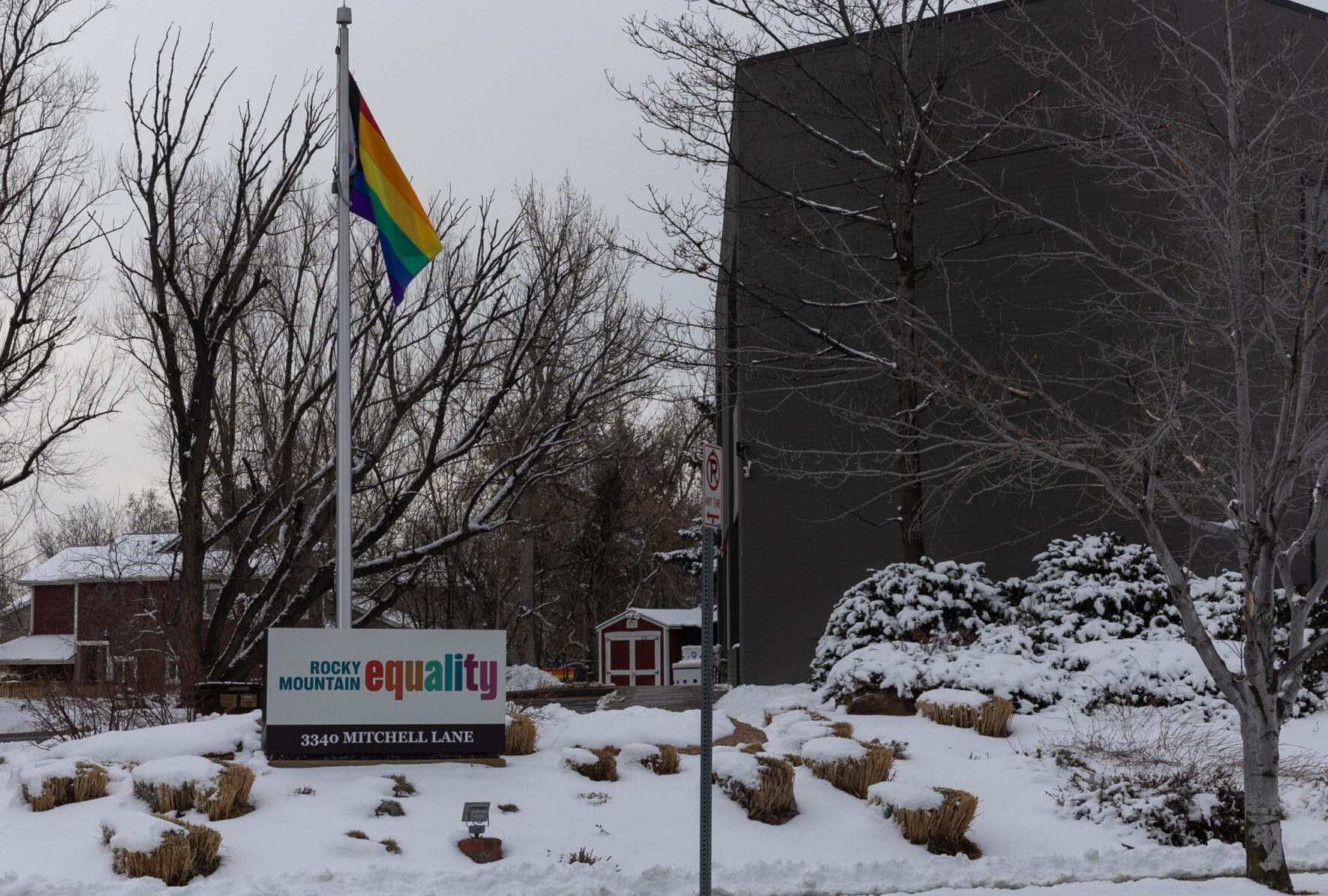
Rocky Mountain Equality, a Boulder-based resource center for the LGBTQ community. (Celia Frazier/Radio 1190)
Editor’s Note: This story was cross-published on the digital webpage of the University of Colorado Boulder’s independent student news outlet, The CU Independent.
By Celia Frazier
Listen to the audio feature here.
In the weeks since returning to office for his second term, President Donald Trump has repeatedly targeted the LGBTQ community.
Of the over 60 executive orders Trump has signed, several have removed protections for transgender and nonbinary individuals. The effects will be far-reaching, even in Colorado, and local LGBTQ activists are stepping up efforts to support the community.
“What we are seeing is terrifying,” says Bruce Parker, the chief operating officer of Rocky Mountain Equality, a Boulder-based LGBTQ resource center and advocacy organization.
The orders, among other things, call for the recognition of only two sexes and threaten to pull funding from hospitals that provide gender-affirming healthcare to patients younger than 19. They also ban transgender women and girls from competing in women’s sports.
The administration says the orders aim to protect children and defend women’s rights. Parker says they put the queer and transgender community in danger.
“They’re trying to erase trans people,” Parker says. “And they’re trying to do it by limiting their access to health care, to the public sphere, and by making it so miserable to be trans that people choose to hide it or kill themselves. Our task is to not let that happen.”
What is the impact?
Trump’s executive orders will have many tangible effects in healthcare, athletics and education. Some activists say the language used in the orders dehumanizes people. That, they say, is more concerning.
Elizabeth Meyer, a professor of education in the Educational Foundations, Policy and Practice department at the University of Colorado Boulder, says she’s worried the orders will scare people into self-censorship.
“As opposed to saying, ‘No, I have the right to have access to this, I deserve this until you tell me no,’ they just don’t even bother asking,” Meyer says. “It really silences and erases and marginalizes a whole bunch of people.”
Meyer also says the orders will walk back the protections provided under Title IX, a federal civil rights law passed in 1972 that prohibits sex-based discrimination in schools that receive federal funding.
Over the years, court decisions have interpreted sex-based discrimination to include not just sex assigned at birth, but also gender identity and gender expression.
“The Trump administration with this gender ideology ban is trying to redefine how sex is defined, and is trying to narrow the protections of Title IX to only females assigned female at birth,” Meyer says.
Last year, the Biden administration attempted to change Title IX rules to clarify that the law protects transgender people from gender identity-based discrimination. In January, a Kentucky judge decided the changes went beyond the president’s authority and struck down the new rules.
“The Office for Civil Rights under Trump is not going to investigate or enforce the interpretation of Title IX that includes gender identity (and) gender expression,” Meyer says.
Transgender women and girls who participate in sports will also be impacted.
An order Trump signed on Feb. 5 states the government will stop funding programs that allow transgender women and girls to compete on women’s teams. The order says programs that allow this “deprive women and girls of fair athletic opportunities.”
The same day, the National Collegiate Athletic Association issued a new policy that bars transgender women from competing in women’s sports. In a statement, the organization said they believe “clear, consistent, and uniform eligibility standards” would serve student-athletes better than “a patchwork” of differing state laws and court decisions.
“To that end, President Trump’s order provides a clear, national standard,” the NCAA said in the statement.
CU Boulder is an NCAA member institution and will follow the new policy, according to Nicole Mueksch, a university spokesperson.
It’s unclear how many athletes the order will impact. NCAA President, Charlie Baker, said in December he knew of fewer than 10 transgender athletes in the NCAA.
Parker says the order will likely have a larger effect on transgender kids and teenagers who compete in youth sports or at the high school level.
“It’s going to cause kids to be more disconnected at a time we need connection more than anything,” Parker says. “It is not what our elected officials should be focusing on, and I am ashamed that we are spending so much time talking about that.”
What does this mean for Colorado residents?
While Colorado is often thought of as a ‘safe state’ for LGBTQ rights, many of the state’s residents will still feel the effects of Trump’s orders.
Education policies, according to Meyer, fall primarily under state jurisdiction. That means state laws, such as a law passed last year that protects K-12 students who choose to use a name other than their legal name, will stay in place despite the federal government’s actions.
“Here in Colorado, we still have extensive protections for LGBTQ students, trans youth in particular,” Meyer says. “None of that changes.”
Parker says he is grateful to live in Colorado because of such laws. But he also says the “safe state” narrative is dangerous.
“Nowhere is safe when the federal government has decided that you are deserving of being erased,” he says.
Regardless of state law, the executive orders will impact many Colorado institutions that rely on federal funding.
By Feb. 5, three Colorado hospitals – Denver Health, UC Health and Children’s Hospital Colorado – announced they would stop providing gender-affirming medical care, such as hormone treatments, to patients under 19. The decisions came in response to a Trump executive order, which declared the government would pull funding from hospitals if they didn’t stop providing such care.
“We have some of the strongest protections for gender-affirming care in the country, and hospitals and providers have canceled gender-affirming care for youth in the past two weeks because of the threat of losing federal money,” Parker says.
On Thursday, a judge temporarily blocked the order after families of transgender and nonbinary children filed a lawsuit earlier this month. The restraining order will last at least until the end of February. The three healthcare providers said they were evaluating the judge’s order as of Friday.
It is also important to remember that Colorado is not uniform, Parker says.
While parts of the state have embraced state laws like the preferred name law, leaders in other parts of the state have expressed their opposition. The Woodland Park school board, which represents a district near Colorado Springs, has already passed a resolution to recognize “only two biological sexes,” reflecting the Trump order’s language.
What are Boulder LGBTQ activists doing?
In Boulder, Rocky Mountain Equality has stepped up its efforts to support the community.
“There’s too much to do for people that need to know that they’re not alone,” Parker says.
The organization works with Colorado lawmakers, elected officials and lawyers to advocate for LGBTQ protections. They also host weekly events and support group meetings, both virtually and in person, in Boulder and Fort Collins. Soon, Parker says, they’ll have four meetings each month for parents of transgender and non-binary kids.
Parker hopes the events will bring people a sense of community.
“It is easy to feel like the solution to these problems is to isolate more because you feel unsafe, but the truth is, we need community all the time, and we need it now more than ever,” Parker says.
He also says it’s important for people who aren’t queer or transgender to support their LGBTQ friends, peers and family.
“Try to find ways to help them have fun and enjoy themselves and feel supported and loved,” Parker says. “For people to be able to spend time with safe people, who they know have their back, is just so key.”
“Progress will continue”
While both Parker and Meyer expressed their concerns about how the executive orders would impact LGBTQ people, they also expressed hope.
“I absolutely believe Martin Luther King Jr. when he says that the arc of the universe is long, but it bends towards justice,” Meyer says. “This is, unfortunately, a very unjust moment, but I believe that our progress will continue.”
Meyer says the progress she has seen in the past decades gives her hope.
“We have, in the past 20 years, had a whole generation of young people who have been raised affirmed and seeing a vibrant and healthy LGBTQ community and expecting to be treated fairly and equitably in all aspects of public life,” she says. “They’re not going to sit down and go away quietly.”
Parker pointed towards the LGBTQ community’s history of resilience.
“Queer and trans people, particularly trans people, have had to be resilient their whole lives, growing up in systems and in a society that is not designed for their success,” Parker says. “In a lot of ways, trans folks and queer folks have the resources they need to weather these moments, but that doesn’t mean that they should have to.”
He recalled growing up in the 80s during the AIDS epidemic, when being gay was widely viewed as “unnatural” and gay marriage was illegal in all 50 states.
“When I was 10 years old, I was certain that I would never be able to get married,” says Parker, who got married in early February. “We also came out of that.”
He encouraged LGBTQ people to be proud of who they are.
“If I had to choose every day, I would choose to be queer because it’s made my life better, and I get to know so many amazing people,” Parker says. “Don’t let the world make you ashamed of who you are.”
“We’re going to come out the other side because we always do.”

